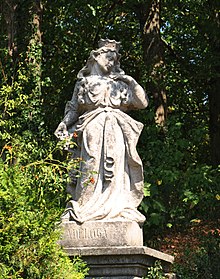Adeloga of Kitzingen
St. Adeloga of Kitzingen | |
|---|---|
| Died | c. 745 Germany |
| Venerated in | Roman Catholic Church |
| Canonized | Pre-congregation |
| Feast | February 2 |
Tradition or genre | Benedictine |
St. Adeloga of Kitzingen, also known as Hadeloga and Adela, is a German saint.[1] Her father was Charles Martel, a Frankish statesman and military leader.[2][3] She was a princess[4] and "of singular beauty".[2] She was sought after for marriage, but she refused, wanting to devote herself to God instead. Her father treated her with "studied brutality and public insult";[2] she went to his chaplain, who was also her spiritual director, for support and advice, so Martel expelled them both from his palace. They journeyed to Kitzingen, in modern Bavaria, a "wild and desert place",[2] where they built a convent. She was made the convent's first abbess; the convent attracted virgins and was directed to follow the rules of St. Benedict and St. Scholastica. Martel later reconciled with and visited Adeloga, and donated lands for her convent.[2]
St. Adeloga is listed in the Benedictine Martyrology, and an ancient biography of her written by an anonymous author and published by Flemish hagiographer Jean Bolland.[2] After her death, she was succeeded at the Kitzingen convent by St. Thecla.[5]

References
- ^ "Saint Adeloga of Kitzingen". CatholicSaints.Info. 31 January 2010. Retrieved 26 May 2020.
- ^ a b c d e f McClintock, John; Strong, James (1887). Cyclopedia of Biblical, Theological, and Ecclesiastical Literature, Volume 2. New York: Harper and Brothers, Publishers. p. 1038.
- ^ Drake, Maurice; Drake, Wilfred (1916). Saints and Their Emblems. London: Dalcassian Publishing Company. p. 2.
- ^ Delaney, John J. (2004). Dictionary of Saints. New York: Doubleday. p. 10. ISBN 978-0385515207.
- ^ Harmeling, Deborah (1996). "Tetta, 'Noble in Conduct' and Thecla, 'Shining Like a Light in a Dark Place'". In Schmitt, Miriam; Kulzer, Linda (eds.). Medieval Women Monastics: Wisdom's Wellsprings. Collegeville, Minnesota: Liturgical Press. p. 104. ISBN 0814622925.
